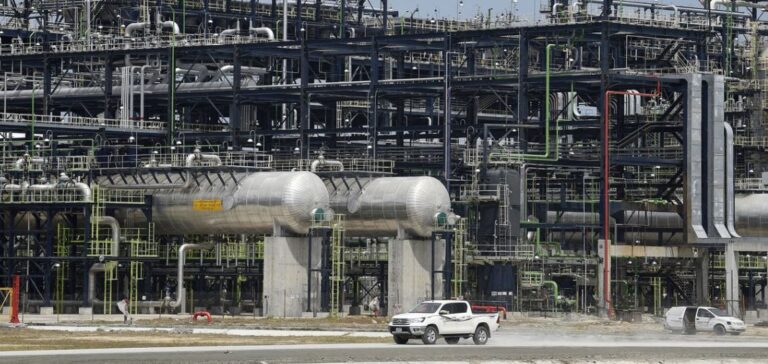The Dangote refinery, flagship of the Nigerian oil industry with a processing capacity of 650,000 barrels per day, faces major challenges in securing its crude oil supply. Since its start-up in January, the refinery has relied on supplies from the Nigerian National Petroleum Corporation (NNPC), which owns 20% of Dangote Refinery, and international oil companies (IOCs). However, the latter now charge high premiums, in excess of $6 per barrel over the market price, complicating refinery operations.
Devakumar Edwin, Vice President of Dangote Industries, expressed his frustration, accusing the IOCs of deliberately making it difficult to buy local crude. This shortage has prevented the refinery from achieving higher operating rates, thus hindering its planned contribution to the transformation of the refinery sector in West Africa.
Late deliveries and financial disputes
Delivery delays, often due to disputes over payment terms, exacerbate the situation. In May, two tankers carrying Midland WTI waited over a month to unload at the refinery, Petrochina having refused payment in the form of refined products. These incidents underline the logistical and financial challenges facing Dangote, accentuated by a recent investigation by the Nigerian Economic and Financial Crimes Commission into alleged mismanagement of foreign currency.
The weakness of the Nigerian currency and limited access to US dollars add to the complications. In January, Dangote’s Lagos headquarters were raided, which the group described as an attempt to cause “unjustified embarrassment”. However, relations with the Tinibu administration seem to be gradually improving.
Regulatory Interventions and Market Outlook
To overcome the reluctance of IOCs, the Nigerian Upstream Petroleum Regulatory Commission (NUPRC) is considering introducing a domestic crude supply obligation. This measure, provided for in the Petroleum Industries Act of 2021, would require Nigerian oil suppliers to deliver their product to local refineries before any export. However, this obligation does not include a tariff component, which means that refineries must buy at the international price.
Devakumar Edwin stressed that local refineries must be prepared to buy crude at world market prices. One trader confirmed that there is no “absolute necessity” to deliver crude to the domestic market if it is not commercially viable.
IOC Departures and New Partnerships
The majority of IOCs, including TotalEnergies, ExxonMobil and Eni, are in the process of withdrawing from Nigeria, selling their onshore and shallow-water assets to Nigerian players. These sales are often delayed by oppositions and legal challenges. However, Chevron, which remains active, continues to establish supply links with the refinery. A Chevron spokesman expressed his support for NUPRC’s efforts to secure crude supplies to local refineries in a transparent and commercially viable manner.
Local consumption and supply
Initially, NNPC, which holds a 20% stake in the Dangote refinery, was to be the main supplier. However, uncertainties about the availability of its supply have emerged. Aliko Dangote, owner of the refinery, highlighted the variability of NNPC’s production, saying that the refinery cannot afford to wait for inconsistent supplies.
In December 2023, the refinery received 6 million barrels of crude from NNPC, but has since sought to supplement its needs with a supply of 2 million barrels per month from the USA. Deliveries of Nigerian crude to Dangote reached a record 6.9 million in May and are expected to rise to 9 million in June, according to data from S&P Global Commodities at Sea.
According to the data, 38 of the 53 oil cargoes delivered to Dangote came from Nigeria, including 17 shipped by NNPC, seven by Shell and four by Chevron. TotalEnergies, after a supply agreement announced in May, delivered only one cargo of Amenam crude in April.
This complex situation underlines the multiple challenges that the Dangote refinery must overcome to ensure a stable and sufficient supply of crude oil. Regulatory efforts, tensions with IOCs and global market dynamics will continue to play a crucial role in the evolution of this flagship project for the Nigerian energy sector.






















